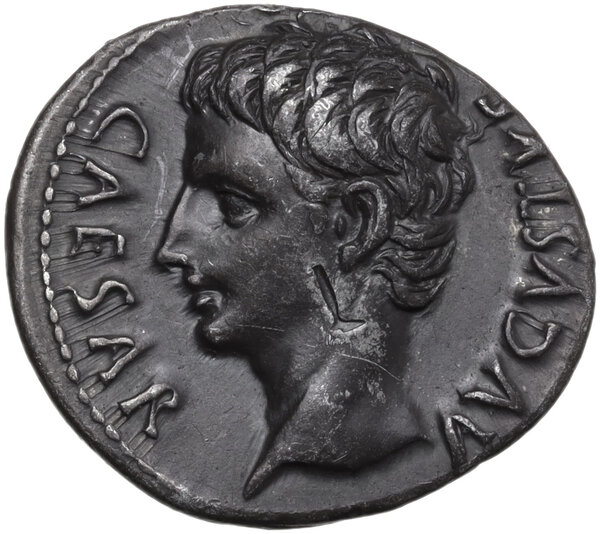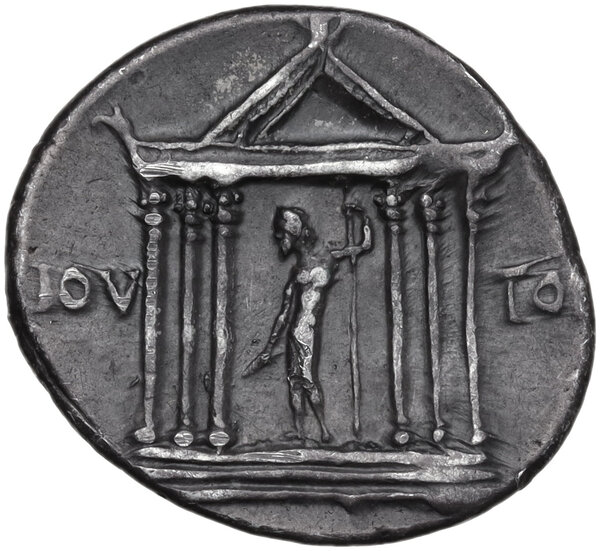The Aedes of Jupiter Tonans


Lotto 514:
Augustus (27 BC-14 AD). AR Denarius. Uncertain Spanish mint (Colonia Patricia?) c. 19 BC. Obv. CAESAR AVGVSTVS. Bare head left. Rev. Hexastyle temple set on podium of three steps; Jupiter Tonans standing left within, holding thunderbolt and sceptre; IOV - TO[N] across field. RIC I (2nd ed.) 64 (R3). 3.78 g. 20.50 mm. RRR. Extremely rare and superb. Lovely bright old cabinet tone, with iridescent hues. Banker's mark on obverse, skillfully camouflaged below the ear, otherwise. about EF. The Aedes of Iupiter Tonans was a temple on the Capitol, vowed by Augustus in 26 B.C. because of his narrow escape from being struck by lightning during his Cantabrian campaign, and dedicated 1st September, 22 BC
The name Iupiter Tonans was a translation of Ζεὺς βροντῶν ('Thundering Jove'). The temple was famous for its magnificence, with walls of solid marble and contained some notable works of art. Augustus visited this temple frequently, and on one occasion is said to have dreamed that Jupiter complained that the popularity of this new temple had sensibly diminished the number of worshippers in the great temple of the god. Whereupon Augustus replied that Jupiter Tonans was only the doorkeeper of Jupiter Capitolinus, and proceeded to hang bells on the gables of the former to indicate this relationship.
This shows that the temple must have stood quite close to the entrance of the area Capitolina, and therefore on the south-east edge of the hill overlooking the forum.
On this reverse it is represented as hexastyle, with a statue of the god standing erect with eftt hand supported by a sceptre, possibly a reproduction of the famous statue of Leochares (Plin. NH XXXIV.79).
(Loosely based on: S.Ball Platner - as completed and revised by T. Ashby - “A topographical Dictionary of Ancient Rome”).
The name Iupiter Tonans was a translation of Ζεὺς βροντῶν ('Thundering Jove'). The temple was famous for its magnificence, with walls of solid marble and contained some notable works of art. Augustus visited this temple frequently, and on one occasion is said to have dreamed that Jupiter complained that the popularity of this new temple had sensibly diminished the number of worshippers in the great temple of the god. Whereupon Augustus replied that Jupiter Tonans was only the doorkeeper of Jupiter Capitolinus, and proceeded to hang bells on the gables of the former to indicate this relationship.
This shows that the temple must have stood quite close to the entrance of the area Capitolina, and therefore on the south-east edge of the hill overlooking the forum.
On this reverse it is represented as hexastyle, with a statue of the god standing erect with eftt hand supported by a sceptre, possibly a reproduction of the famous statue of Leochares (Plin. NH XXXIV.79).
(Loosely based on: S.Ball Platner - as completed and revised by T. Ashby - “A topographical Dictionary of Ancient Rome”).
Base d'asta € 500
Prezzo attuale € 1700
Offerte: 21
Lotto non in vendita
Prezzo attuale € 1700
Offerte: 21
Lotto non in vendita





